Use your just picked apples to make an all natural treat!
Making your own homemade applesauce
There are some things we are so used to seeing in packaged form we never consider making it at home. I think applesauce is like that. But you might want to try making some. It’s really easy to make at home and worth the little bit of time it takes. I made my first batch of homemade applesauce in cooking class in school, just a few and a few more years ago.
I always have fresh apples on hand during apple season because I love going to the orchard to pick them. On an autumn day I love being in an apple orchard. I talk about why I love being there it in my post Apple Picking Time. Once home, I have to do something with all those apples I picked! Homemade applesauce is a quick and easy way to use a few apples, get creative and enjoy the fruits of my labor. 😋 (pun intended)
Why bother making it?
If you need to ask that question you probably have never tasted homemade applesauce. Making your own takes more time than opening a store bought container for sure. But homemade applesauce doesn’t take very long to make and is so so much better than store bought, especially while it is still warm. And it’s a sweet treat you can feel good about eating whether you are having it as a side dish, snack or dessert.
Making your own homemade applesauce is probably not something you are going to do on a regular basis. I certainly don’t. But during apple picking time when you have some apples on hand it’s a great seasonal fruit dessert. And if you haven’t picked the apples yourself they are always priced to sell at grocery stores and fruit stands in the fall when they are abundant.
Want to make your homemade applesauce even better? It is off the charts good with ice cream. I like it with vanilla ice cream but I just know it would be great with butter pecan or caramel or any number of other flavors. It’s such a treat!
Making it your way
Use ingredients you like
Applesauce only needs a couple of ingredients; apples and a liquid to steam them in. Any other ingredients give the applesauce more sweetness or flavor. You can use flavors you like.
You can choose what apples you want. They all have a different taste. Some are sweet and some are tart. If you have a favorite apple make the sauce with that. I like making it with a mix of varieties. Unlike some recipes where it is better to use apples that will stay somewhat firm when you cook them, in applesauce they all work. It’s okay if they fall apart when cooking, you are going to mash them up anyway.
You can add a host of sweeteners. Use natural sweeteners like maple syrup or honey in your applesauce, white or brown sugar, a sugar substitute OR no sweeteners at all! For this homemade applesauce recipe we are going natural and using maple syrup. It’s a perfect pairing for apples. I like that it is a 100% pure natural product and it adds fantastic flavor too. It’s a win, win for me.
When cooking with apples people usually think of adding favorite warm fall spices like cinnamon or nutmeg, ginger, cardamom or cloves. Pick and choose from any of them and you can’t go wrong.
Like so many other recipes, there are no wrong choices when you use ingredients and flavors you like.
Make it chunky or smooth
You can make your applesauce silky smooth, leave chunks of apples in it or anything in between. We are going to mash the apples when they get soft just like you would potatoes. If you want it as smooth as store bought, put your finished applesauce in a food processor to get your desired consistency. I like soft warm chunks of apples in mine.
You can also decide whether you want it juicy or more condensed to make it thicker. That is all up to you. It’s only a matter of how long you cook it after your apples are mashed.
Here’s What we are going to use:
These are the ingredients I gathered for this batch of applesauce.
Apples
Use any kind you want. I am using a variety of what I have on hand; a couple of granny smith apples, a couple of red delicious and some pink lady apples. Not all apples are the best for making pies or even cobblers because they get mushy when they cook. But we don’t care about that in this recipe. We are going to mash them up anyway. Later you will see the difference in the cook time and texture of different varieties in one of our cooking pictures. Some kinds of apples melt down on their own and some maintain their shape. take longer to get tender and need to be mashed. It’s all good in applesauce.
How many?
I usually use 6-8 apples for a batch. I use my big 8 cup measuring bowl and fill it with chopped apples. It might look like a lot in the bowl, but apples have a lot of water content. When the water cooks out this batch will make about 3 cups, more or less depending on how chunky or smooth you make the finished applesauce.
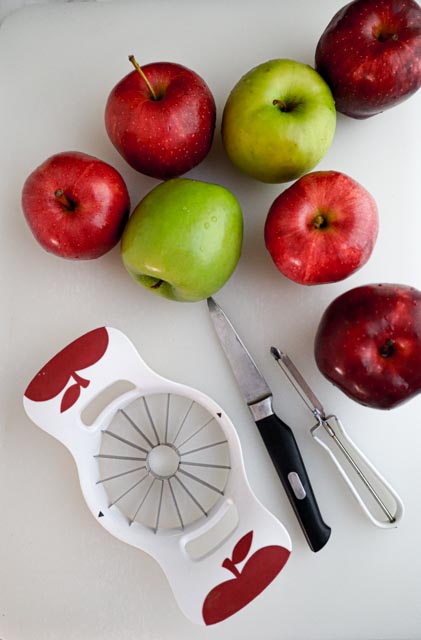
Pick out a few apples. Some of the kitchen tools that you can use to core and peel the apples are lined up. From the bottom up: the white circular tool with the handles takes the core out and slices the apple at the same time. Next up is a paring knife, my tool of choice for preparing apples and next to that is a vegetable peeler.
There are other tools to get the job done, some more mechanical than others, but these are some basic inexpensive ones.
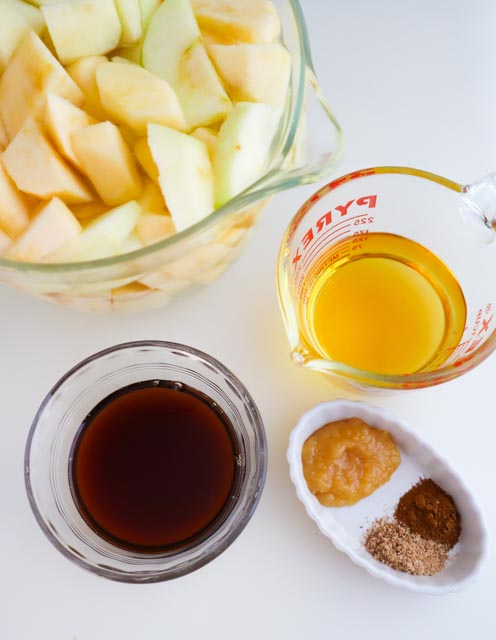
| 6-8 large apples (usually about 8 cups) cored, peeled and cut up |
| 3/4 cup cider |
| 1/3 cup maple syrup |
| These are the flavorings I am using: |
| 1 tablespoon jarred chopped ginger (use 1/2 teaspoon if using dried) |
| 1/2 teaspoon cinnamon |
| 1/2 teaspoon nutmeg |
TIP: If you are adapting the spices to your own taste keep the combined amount to about 1 or 1 + 1/2 teaspoons so you don’t overpower the mild taste of the apples. If you are using something strong like cloves you should use even less.
Maple syrup
Once fall arrives I hit the maple syrup hard. Maple syrup is a natural pairing for apples and squashes. It’s fantastic in baked goods and it can be used as a unique ingredient in a savory dish like our PORK CHOPS APPLES AND ONIONS.
You need to get the real stuff though. Especially in cooking you should use 100% pure maple syrup, not the other stuff commonly found on grocery shelves. You are going to know which is real and which is not by the price tag.
Real maple syrup is a limited commodity. It starts as the sap of a maple tree and there’s only one season that the maple tree gives up sap to harvest. That is spring. The nights have to be cold and the days need to be warm or the sap is not produced by the tree. Among those harvesting maple sap the buzz phrase for time to harvest is “the sap is running”. The sap runs on the weather’s whim, not by our calendars.
There’s a lot of plain old grunt work to get the sap from the woods to the sap house. It’s quite time consuming to boil sap to syrup and it also takes lots of heat to keep the evaporator hot enough to boil. The average small harvester uses wood as fuel to heat the evaporator. With what it takes to make a quart of real maple syrup it’s reasonably priced.
Real maple syrup is one of the healthiest natural sweeteners you can use and a little goes a long way.
The other stuff
When you look at the label of those common imposters, you will note that it never ever says it is maple syrup, because it isn’t. The description of pure maple syrup is protected from fraudulent use. The imposters will be called maple flavored. They are usually high fructose corn syrup, which is corn syrup in its most unhealthy state, vaguely flavored with a maple extract. There are all kinds of other additives too. If you read the ingredients, you may never want to feed it to your family again.
That stuff is made to be sweeter than sweet. You would be better off melting some white sugar in water adding some maple extract and pouring it on your pancakes. It would be heathier.
Steaming liquid
I usually use cider or apple juice as the steaming liquid. It boosts the apple flavor a bit and adds a little sweetening too. You can use water if you don’t have apple juice or cider. The cider I am using is not pure pressed cider it’s not in season yet. Pressed cider is my preference though. The fresher the better. It’s best when bought right at the apple farm.
Flavoring
You don’t need to add any spices at all. Applesauce made with apples, cider or apple juice and maybe a little of something to sweeten it is great on it’s own. But if you want to add more fall flavors you most definitely can. With spices added it tastes more like apple pie filling than bottled applesauce from the store.
I am adding some fresh ginger, cinnamon and nutmeg. Fresh ginger has a bright and fresh flavor. I use it quite often. To find out more about ginger we have a cooking tidbit Using Ginger fresh and ground. Any of the fall spices you like, you can use. Cloves, cardamom, pumpkin pie spice are also great with apples. Because apples have a mild flavor, be conservative with stronger spices like cloves. As a general rule I would say you should start with a total combined amount of 1 teaspoon or 1 1/2 teaspoons of spices or less. We are adding them at the end. You can always add more when you taste test.
You can add a touch of vanilla to accentuate the apple flavor. You could even add a smidge of spiced rum or apple liqueur as a flavoring. If you are using an alcohol for flavoring, put it in when the apples are boiling down so the alcohol content will evaporate out.
The possibilities are boundless. As always, the only rule of thumb is to use ingredients you like! Then you know you are going to enjoy the finished product.
Here we go 👩🍳🍎🍏
Preparing the apples
Preparing apples for applesauce is the same as it is for most apple recipes. You need to get the core out, peel the apples and slice or chop them.
Apples start turning brown soon after they are cut. It doesn’t effect the flavor so in some recipes the browning doesn’t matter much. But since I am making applesauce and the color of the finished product may be effected, After I have cored, peeled and sliced the apples I am going to put them in cold water that has a couple of tablespoons of lemon juice added. It doesn’t have to be freshly squeezed lemon juice. Bottled lemon juice is fine but make sure you get 100% pure lemon juice. Lemonade won’t work. The acid in the lemon stops the apples from browning.
There’s a name for that
This technique of using an acid in cold water to keep a fruit or vegetable from browning is referred to as “acidulating“. In your cooking journey you may bump into words like that. If you have never seen or heard it before, of course you are going to stop short and wonder what the heck does that mean? Fancy terms like that can be the reason people think they don’t know enough to cook. That’s why I introduce words such as acidulate with an explanation in our recipes.
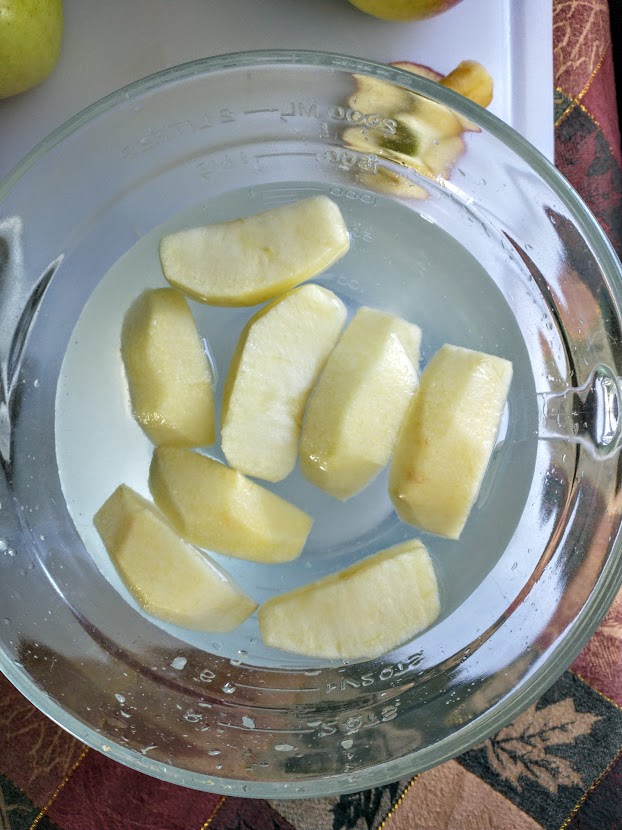
To keep cut apples from browning, put them in cold water with one or two tablespoons of lemon juice (fresh or bottled) added to it. Using this method to keep apples from turning brown after they have been peeled is referred to as acidulating.
Another handy tip to know about lemon juice
Did you know that you can make buttermilk from everyday dairy milk by adding lemon juice or vinegar? That’s a handy thing to know. You use 1 tablespoon of lemon juice or vinegar for each cup of milk.
Buttermilk is a common ingredient in baking. I don’t usually have buttermilk on hand, so unless I have planned ahead to make a recipe that calls for it, I use this handy tip.
Since I am usually baking a sweet treat when I need buttermilk, I use lemon juice most often. When it is added to the milk it thickens and small soft curds form. If a baked good recipe calls for buttermilk, don’t use milk without adding an acid to it. The acid is needed to interact with the leavening agent that will make your baked goods rise.
Back to our apples 🍎
Get the core out and peel
When you are working with a round fruit or vegetable that you are going to be cutting from top to bottom, cut the bottom end off so you can place it (apple in this case) flat on the surface you are cutting on. It is more stable. It’s much safer than trying to balance and cut at the same time.
There’s a lot of ways to cut the core out
An apple corer and slicer
Cut off the bottom of the apple so it can sit flat on the cutting surface. Center the round hole in the cutter over the top where the stem was. That’s where the core is. Once positioned, hold the tool by the handles and push straight down into the apple all the way to the bottom. You may need to rock it back and forth to push it through.
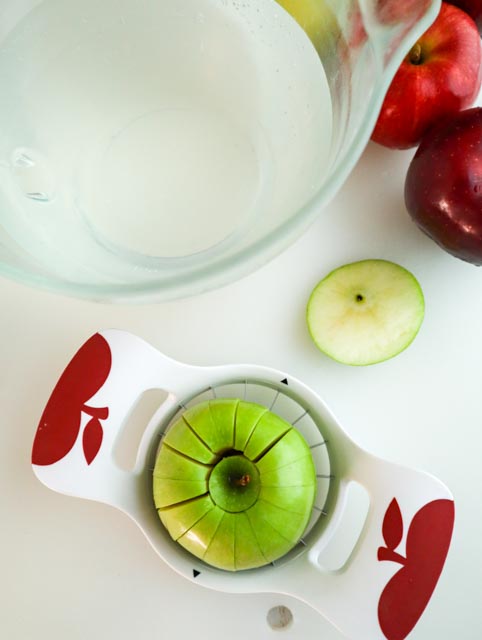
I cut the bottom of the apple off so it can sit flat on the cutting surface. You can see the bottom I cut off just above the apple I’m working on.
This tool is made for coring and slicing apples. It’s easy to use and inexpensive.
I have my cold water with lemon ready for me to put my apple slices in so they don’t brown while I am getting the rest of the apples chopped.
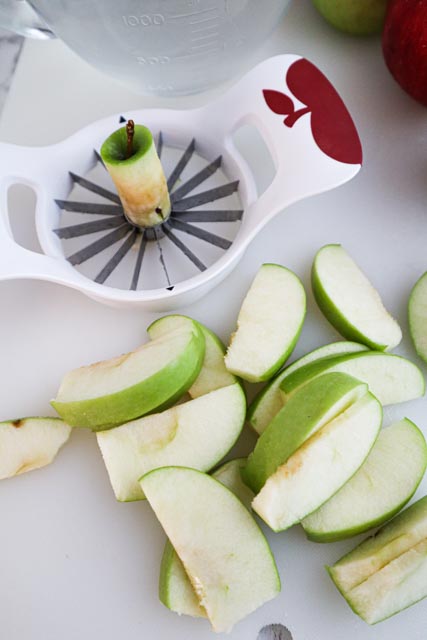
The core is still in the middle of the corer and I have pulled the slices out.
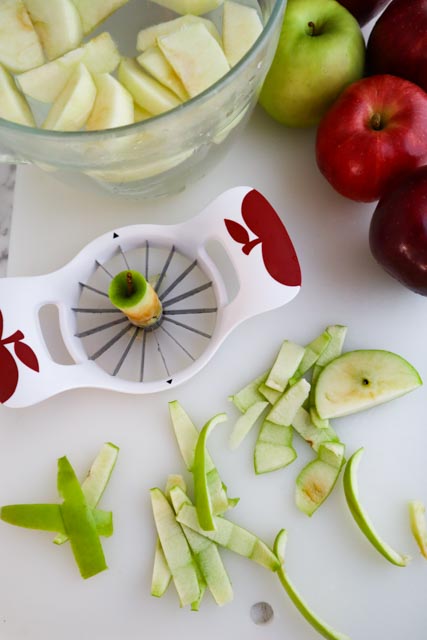
With my paring knife I have cut the skin off the slices. I could have used the vegetable peeler also.
I am putting the apple slices in my bowl of cold water with lemon juice
Cut the apple in quarters
As shown below, you can use a paring knife for the whole job. This is the way I do it. It is easier for me. I cut the bottom off so it sits flat on the cutting surface and peel the skin off. Then I cut the apple in quarters and cut out the core from each of the quarters.

I have cut the top and bottom off the apple and then peeled the skin off. Then I cut them in quarters from top to bottom.
Now all I have to do is cut the core out of each quarter and chop them up.
Slice around the core
You can cut the apple into pieces around the core too like in the picture below. You cut the top and bottom off, peel the apple and then cut pieces off around the core.

I cut off the top and bottom, peeled the apple and sliced pieces of off around the core.
On the right side of the board I have the top and bottom I have cut off, the skin that has been peeled off and the core that was left after I cut slices off around it.
Time to make the Applesauce
Steam the apples
Use a large saucepan
Add the cider and chopped apples to a good sized saucepan. We are using the cider as a steaming liquid. We don’t need to use a steaming basket for this because we want the liquid to be absorbed into the apples. On medium high heat get the cider hot enough to start steaming. Then put the cover on the saucepan and turn the heat down to medium low and steam the apples until they are tender.
Stir the chopped apples frequently to make sure all the pieces are getting cooked evenly. Also check to make sure there is still enough steaming liquid in the pan to prevent the apples from sticking to the bottom. If your liquid has evaporated to the extent you are worrying about sticking, just add a little more water or whatever liquid you are steaming with.
Depending on the size of the apple pieces and what apples you are using, the apples will take 15-20 minutes to get tender.
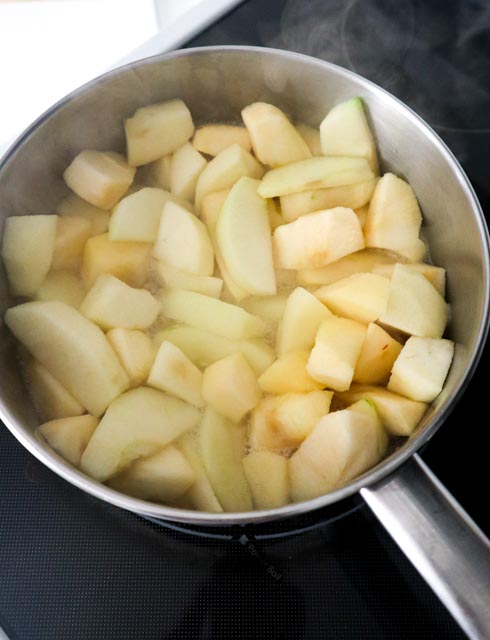
Notice how each of the 3 varieties of apples I used are different colors. Later you will see that they have different textures also.
When the liquid is hot enough to steam, turn the heat down to medium low and put a tight fitting cover on the pan. If you don’t have a lid that fits, put aluminum foil over the top. When removing the foil to check the apples, be careful not to get burned by the steam.
Different apples different texture
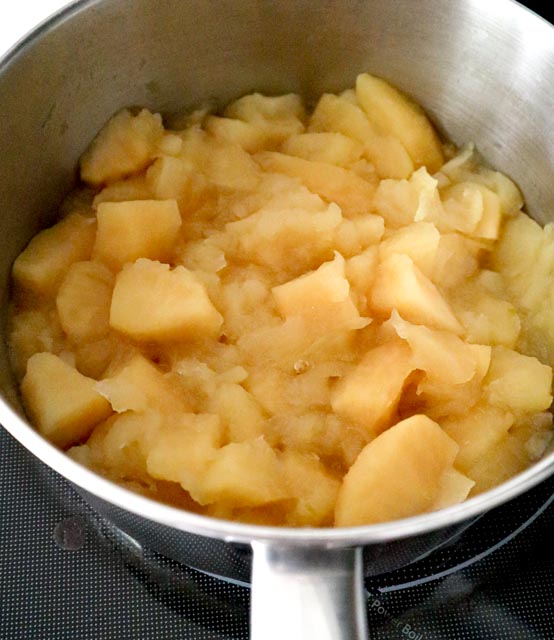
We are about half way through cooking. See how some of the apples have started to break down and others have kept their shape? This is due to the different varieties of apples I used. The ones that break down during cooking are not good for pies or any recipe where you want chunks of apple after the apples are cooked. They are all okay for applesauce though.
Mash
Start mashing the apples while they are still on the heat when they are really tender. Stop mashing when you reach your desired texture. If you have more moisture in the applesauce than you want, turn the stove up to medium or medium high and get the applesauce to a slow boil and stir continually as the liquid evaporates.
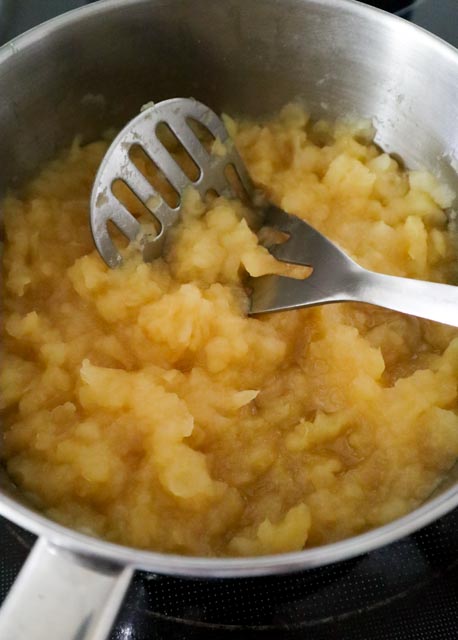
When you have mashed the apples to the consistency you want, there may still be a good amount of liquid in the pan. If so, turn the stove up to get the applesauce to a slow boil and let the excess liquid evaporate. Continue to stir until it is your version of just right.
Add sweeteners, spices and any other flavoring
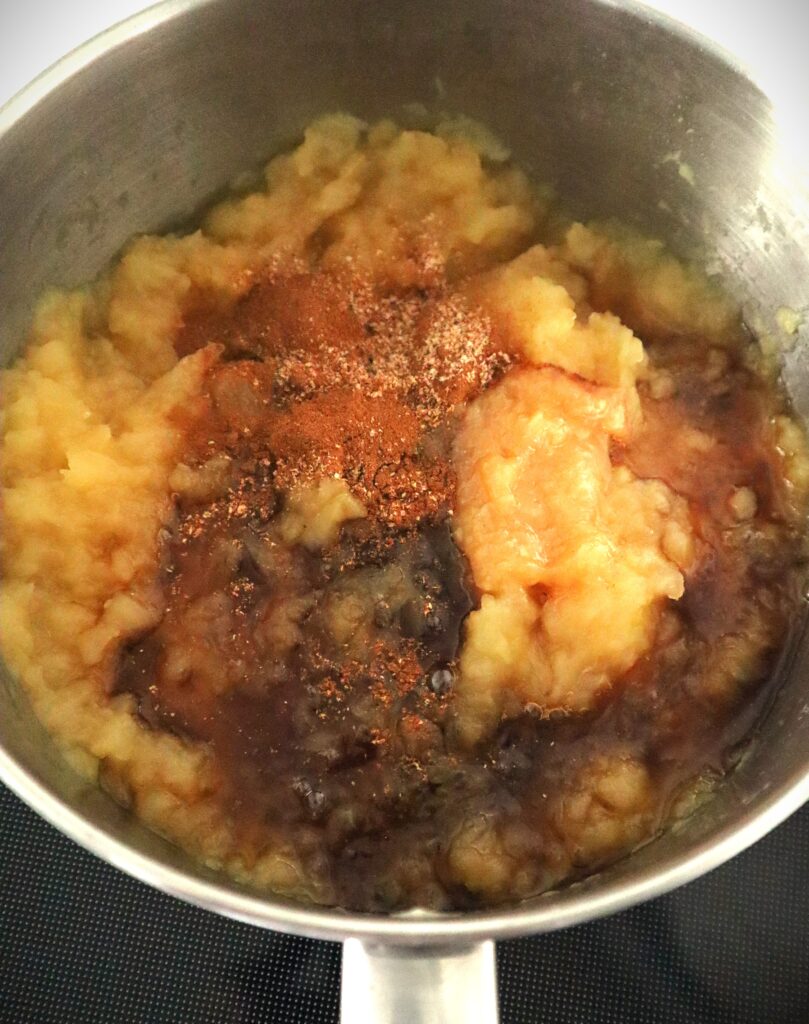
Add in the maple syrup, ginger, nutmeg and cinnamon. Stir them in well while your applesauce is still on the heat. Let the flavors meld with the applesauce for about 3 minutes as you continue to stir.
Serve
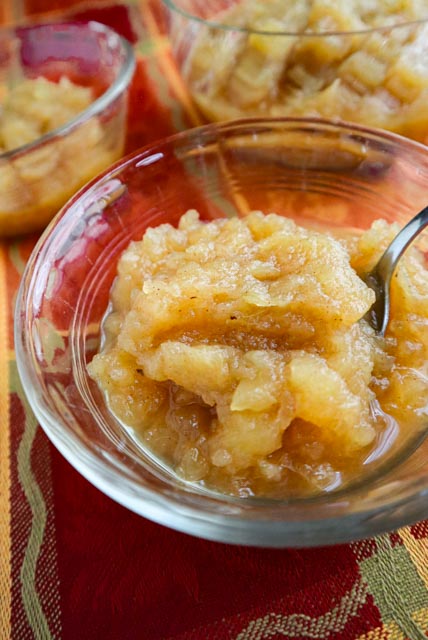
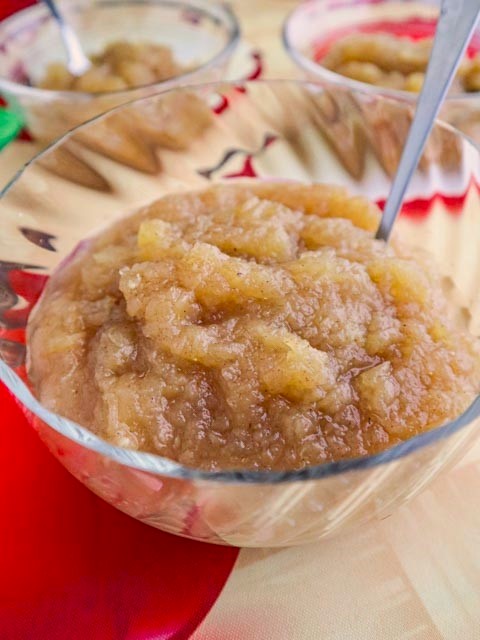
Homemade Applesauce
Ingredients
- 8 cups apples 6-8 apples peeled and cored
- ¾ cup cider or apple juice or water
- ⅓ cup maple syrup pure maple syrup only
- 1 tablespoon ginger fresh jarred chopped or 1/4 teaspoon ground ginger
- ½ teaspoon cinnamon
- ½ teaspoon nutmeg
Instructions
Prepare Ingredients
- Peel, core and chop the apples.
Cooking Instructions
- Add the cider, (or apple juice or water) and the chopped apples to a large saucepan. On medium high heat bring the liquid to a boil so it is steaming. Cover with a tightly fitting lid and turn the heat down to medium low heat to slowly cook the apples.
- Stir apples frequently to prevent sticking or uneven cooking. If the cooking liquid has evaporated, add a little more. Stay on medium low or medium heat. When apples start getting soft, start mashing the apples while they continue to cook. The apples will release moisture while being mashed. Keep mashing until you have the consistency you prefer; chunky or smooth.
- Add the sweeteners spices and flavorings and continue cooking, stirring continuously for about 3 minutes to meld all the flavors. Remove from heat.
- If you want the applesauce super smooth put the cooked applesauce in a food processor or you can use a strainer and use the back of a spoon to press the applesauce through.
- Delicious served warm. If you are going to eat it later, let the applesauce cool and then refrigerate. Great served over ice cream too!
